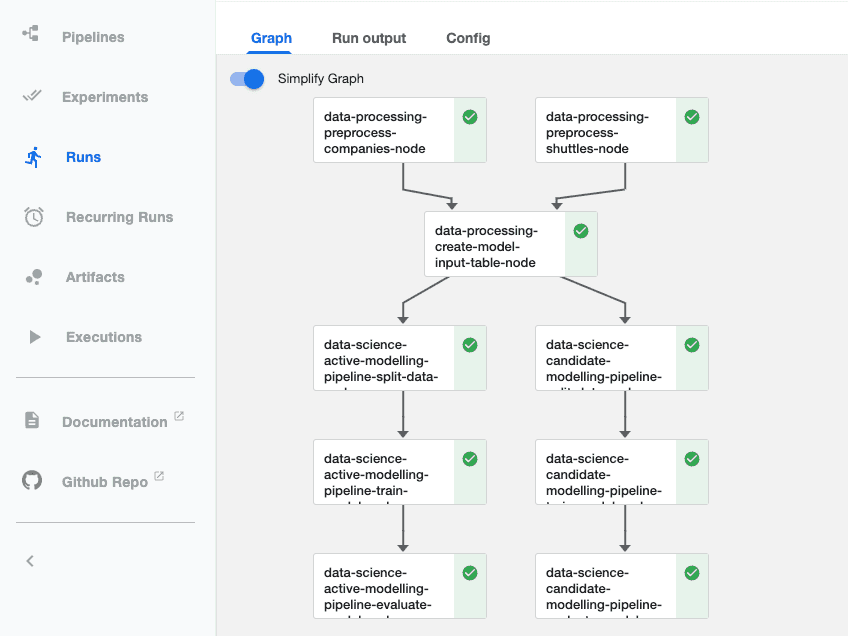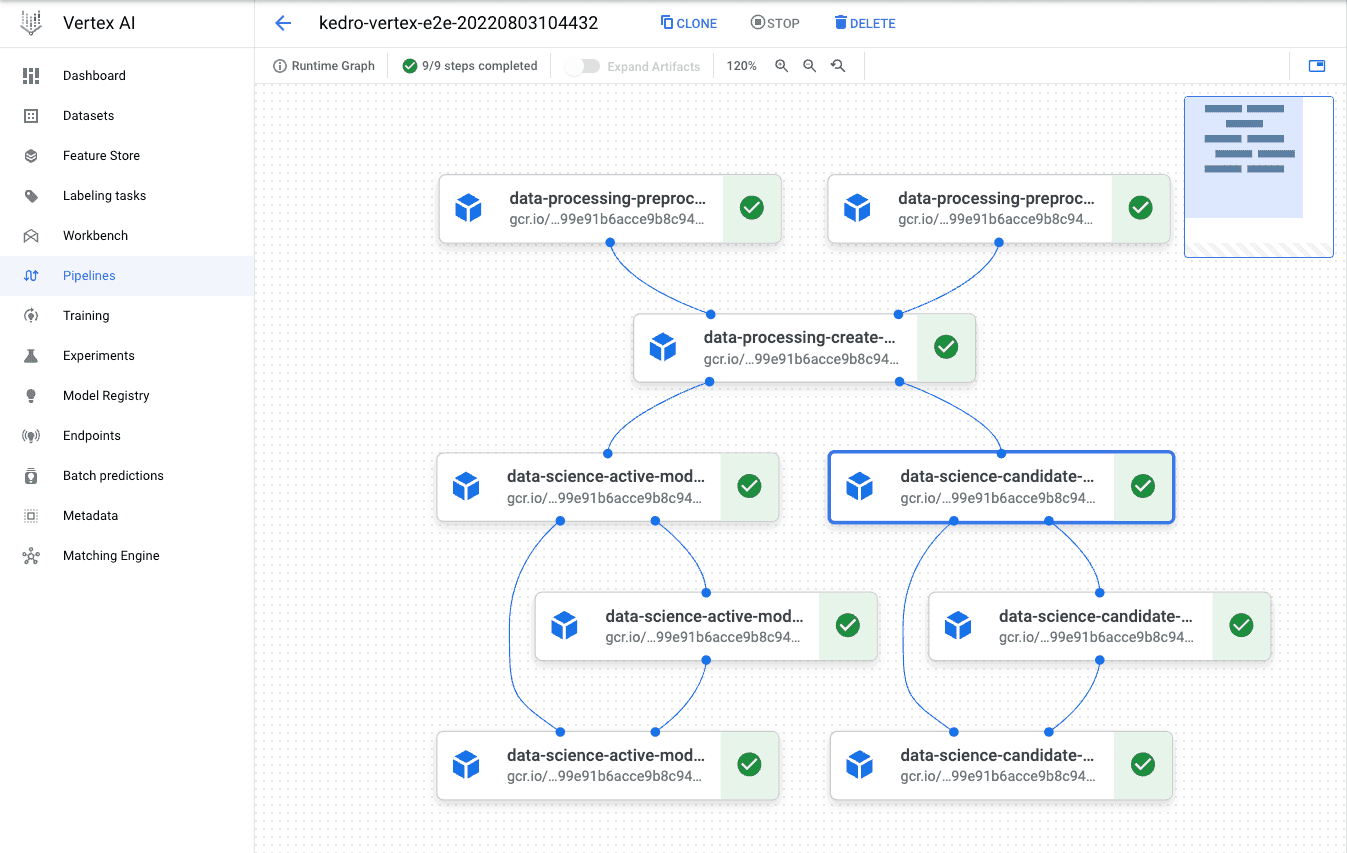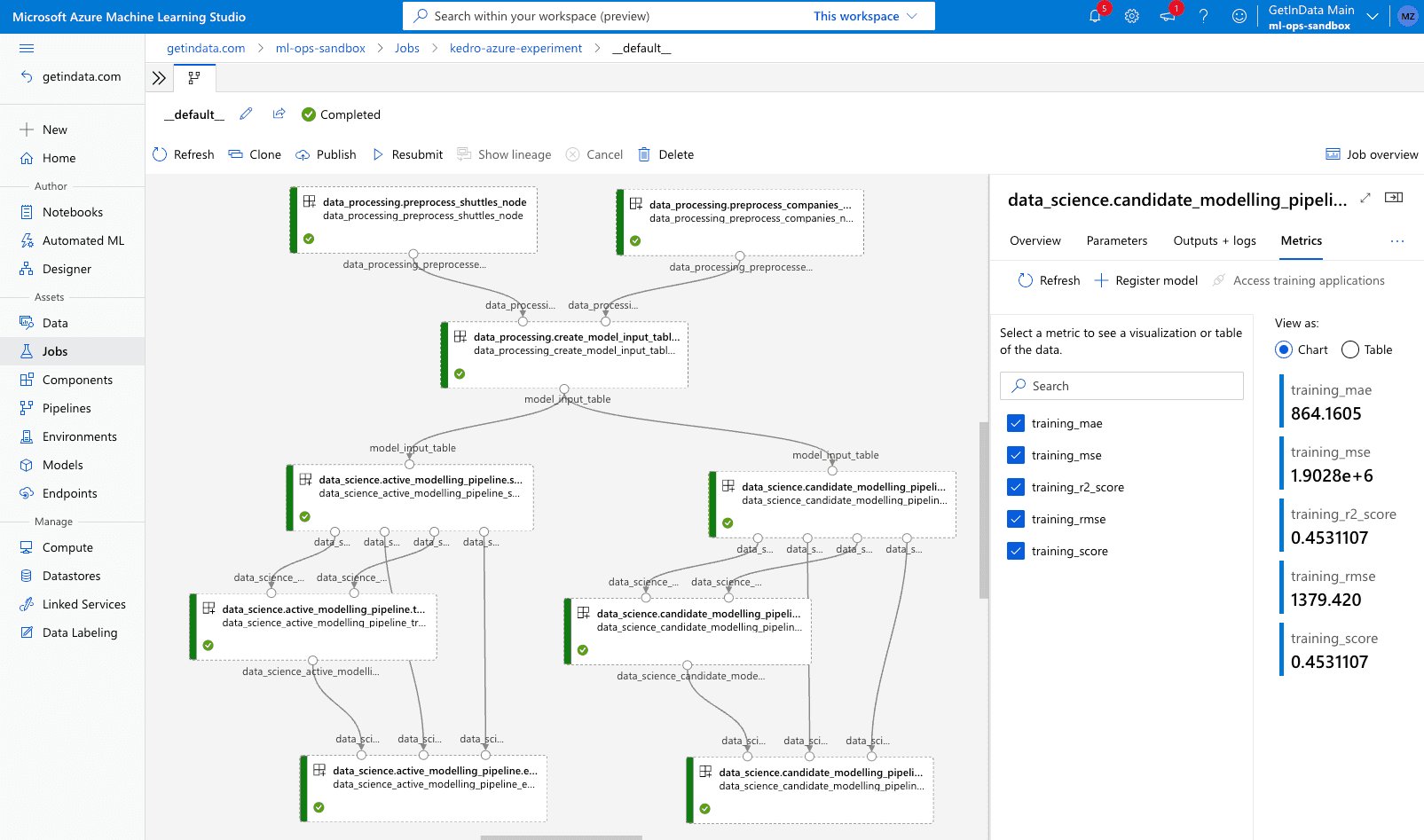Review of presentations on the Big Data Technology Warsaw Summit 2020
It’s been exactly two months since the last edition of the Big Data Technology Warsaw Summit 2020, so we decided to share some great statistics with…
Read moreBuilding reliable machine learning pipelines puts a heavy burden on Data Scientists and Machine Learning engineers. It’s fairly easy to kick-off any ML/AI-driven project with a small team in Jupyter Notebook, but the teams realize fairly quickly that the notebook needs to be transformed into some kind of pipeline, not only to be able to repeat the experiments but also to scale the process e.g. to bigger data or to more sophisticated machine learning models. Here is where Machine Learning Operations (MLOps) come into play. Building machine learning pipelines is one of MLOps best practices.
At GetInData, we hear this story many times from our customers. Our go-to solution for the first part of the problem - building a reliable machine learning pipeline - is usually a recommendation of the Kedro framework.
The briefest definition of Kedro from documentation is:
Kedro is an open-source Python framework for creating reproducible, maintainable and modular data science code.
On the one hand that’s “just” it, on the other, it's really a lot. Kedro provides code structure for machine learning projects by following best software engineering practices without limiting the Data Scientists’ capabilities - they can use all of their favorite ML frameworks such as XGBoost, Scikit-Learn, Tensorflow or PyTorch. It introduces abstractions of a pipeline (which describes the logic of the ml project) made of nodes (to perform actions). Nodes consume and output artifacts like data or models (with the abstraction of Data Catalog). It’s all enriched with software engineering goodies such as: convention based folder structure, environment aware configuration, event hooks, parametrization, pipeline composition, execution management, unit tests and others. Kedro itself is part of the LF AI & Data foundation and was produced by McKinsey and QuantumBlack in August 2021.
Getting back to the story - by using Kedro we address the following challenges in ML projects:
What about scalability? By default, Kedro runs the pipelines locally (or on a remote machine) either sequentially or in parallel (with the use of Python’s multiprocessing, which introduces some challenges). Out-of-the-box, it does not scale well to larger models/datasets as it’s limited by the capabilities of the single node (laptop/virtual machine/other).
At GetInData we’ve solved this limitation by implementing both cloud-native and cloud-agnositc plugins for Kedro, that allow us to run the Kedro pipelines at scale on various serverless/managed cloud services from ALL of the major cloud providers - Google Cloud Platform, AWS and Azure as well as on existing Kubernetes-based infrastructures - Kubeflow Pipelines or Apache Airflow.
GitHub: https://github.com/getindata/kedro-kubeflow
Documentation: https://kedro-kubeflow.readthedocs.io/en/stable/
By using the Kedro-Kubeflow plug-in, we enable users to automatically translate Kedro pipelines into Kubeflow Pipelines and run them on KFP clusters. All of the nodes can have distinct CPU, memory or GPU requirements, which enable ML Engineers to easily scale the pipeline in computationally-heavy places, while light nodes might run on lower resources.
As Kubeflow Pipelines itself is cloud-agnostic, you will be able to run and scale your Kedro pipelines in any Kubernetes cluster - either in-cloud (AWS, GCP, Azure) or on-prem.

GitHub: https://github.com/getindata/kedro-airflow-k8s
Documentation: https://kedro-airflow-k8s.readthedocs.io/en/0.8.0/
This plugin allows the running of Kedro pipelines with Apache Airflow on Kubernetes Cluster. In contrast to kedro-airflow, this plugin does not require additional libraries installed in Airflow runtime, it uses kubernetes infrastructure instead. The plugin itself compiles a Kedro pipeline into Apache Airflow DAG definition - once done, the DAG can be uploaded to an Airflow instance and run. Additionally, the plug-in supports using an external Spark cluster as a computation environment. If you don’t want to host Kubernetes, but you like the containerized execution model on AWS, we've got you covered here too - an experimental version of the plugin can run on AWS MWAA (managed Airflow) and deploy containers to ECS instead.
You can read more about kedro-kubeflow and kedro-airflow plugins in our previous blog post Running Machine Learning Pipelines with Kedro, Kubeflow and Airflow written by Mariusz Strzelecki
GitHub: https://github.com/getindata/kedro-vertexai
Documentation: https://kedro-vertexai.readthedocs.io/en/stable/
Vertex AI Pipelines is a Google Cloud Platform service that aims to deliver Kubeflow Pipelines functionality in a fully serverless fashion. No manual configuration is needed (and there is no Kubernetes cluster here to maintain - at least not visible to the user). You schedule the pipeline and the service takes care of all of the infrastructure for you.
By using our Kedro-VertexAI plugin, you can run Kedro Pipeline on Vertex AI Pipelines service - again - we do all of the heavy lifting for you. Specify resource requirements (CPU/Memory/GPU) and run the pipeline. It’s one of the easiest ways of scaling up Kedro pipelines if you’re using the Google Cloud Platform.

GitHub: https://github.com/getindata/kedro-azureml
Documentation: https://kedro-azureml.readthedocs.io/en/stable/
If your cloud platform of choice is Azure, we've also got your back! Just recently (August 2022) we published the Kedro-AzureML plugin that enables you to run Kedro pipelines in the Azure Machine Learning Pipelines service. Similar to Vertex AI - Azure ML Pipelines is also a fully managed service that provides easy scale-up capabilities. ML Engineers need to set-up compute clusters first, but it’s an easy process, which can be handled without the involvement of the DevOps teams. Once done, Kedro pipelines can be executed on Azure ML Pipelines. Moreover, metrics and trained models can be easily tracked using Azure ML’s built-in MLflow integration, without any additional configuration and our plug-in supports that.

We encourage you to watch this step-by-step tutorial about the Kedro-AzureML plugin that enables you to run Kedro pipelines on Azure ML Pipelines service.
We highly encourage you to try out Kedro in your machine learning projects and leverage one of our open-source plug-ins to run and scale Machine Learning pipelines in the cloud! Feel free to reach out to us on GitHub if you encounter any issues with the plug-ins, we’re always happy to help. Happy coding!
Interested in ML and MLOps solutions? How to improve ML processes and scale project deliverability? Watch our MLOps demo and sign up for a free consultation.
It’s been exactly two months since the last edition of the Big Data Technology Warsaw Summit 2020, so we decided to share some great statistics with…
Read moreData Mesh as an answer In more complex Data Lakes, I usually meet the following problems in organizations that make data usage very inefficient: Teams…
Read moreStreaming analytics is no longer just a buzzword—it’s a must-have for modern businesses dealing with dynamic, real-time data. Apache Flink has emerged…
Read moreIn this episode of the RadioData Podcast, Adama Kawa talks with Arunabh Singh about Willa use cases ( FinTech): the most important ML models…
Read moreSnowflake has officially entered the world of Data Lakehouses! What is a data lakehouse, where would such solutions be a perfect fit and how could…
Read moreIn this episode of the RadioData Podcast, Adam Kawa talks with Michał Wróbel about business use cases at RenoFi (a U.S.-based FinTech), the Modern…
Read moreTogether, we will select the best Big Data solutions for your organization and build a project that will have a real impact on your organization.
What did you find most impressive about GetInData?